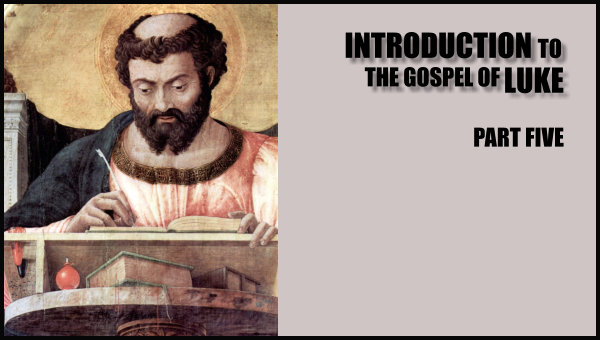By Tyson Thorne

Luke 3.1-38
Luke continues his hop-scotch through time, now leading us to an adult John the Baptist in the midst of his ministry. At first glance it appears that Luke is overdoing it with the number of rulers he validates in the first three verses of chapter three. Why should he bother with it? For a couple of reasons. First, to establish the time the events took place (this is a historic record, after all). Second, the benefactor of the book, Theophilous, would be familiar with these rulers if not personally then by reputation. This firmly establishes the time and historicity of John’s ministry.
To prove John’s legitimacy as a prophet and of his calling, Luke quotes from Isaiah 40. The other Gospel writers do likewise but quote only the first four verses, only Luke continues through verse six. That verse reinforces Luke’s big idea that Jesus is the savior and rightful king of all humanity. That is Luke’s message, but John’s is different.
John challenges the notion of the day that Hebrews were automatically saved from the second death because of their ancestry. It may appear at first that John is advocating a works based salvation, that only through “good fruit” will they be saved but this is a shallow understanding. Instead, John argues that they cannot rely on their heritage, but rather on their hearts. A person whose life is characterized by good works (or “fruit”) is someone whose heart is right with God. Therefore it is not works or ancestors that save one’s soul, but one’s connection with God. This is the core gospel message that Jesus will also preach.
So powerful was John’s message that the people wondered if he was the promised Messiah. If John were inclined to feed his ego, or a charlatan like some televangelists have proven to be, John could have ridden this wave of popularity. But he had spent too much time in the desert with God to have any such pretensions. Instead, he tells the people the truth; he is not the Messiah nor is he worthy of having any audience with God’s chosen. As a true prophet, John was all to inclined to tell the truth which is what got him into trouble. John exposed an unbiblical relationship between Herod and Herod’s sister-in-law, resulting in his imprisonment.
Yet before this unfortunate incarceration, Jesus came to John to be baptized. By doing so Jesus was identifying with and validating John’s teaching on salvation. After the baptism, a vision was given to Jesus and John from the Holy Spirit which was an additional validation. This time it was Jesus who was validated, and in a way that included only God’s servants. The crowd was not included in the vision of the dove nor did they hear God’s voice. For them, the truth about Jesus would have to be discerned by faith alone.
This is the first proof of Jesus’ authenticity as Messiah; Luke offers us two more. The second is the genealogy of Jesus, which provides some difficulty when compared to the one Matthew provides. There are many theories as to the stark differences in these two accounts, which we will not examine due to the constraint of time and space. The one theory that fits best at this time is that Matthew traces the lineage through Joseph to establish Jesus’ connection to the royal line of David, whereas Luke follows Mary’s line. It makes sense for Luke to use Mary since Jesus has no physical connection to Joseph, and Jesus’ physical lineage is important to show his connection to all humanity (reinforcing his big idea). This may also be why Matthew stops with Abraham and Luke goes all the way back to Adam. It is important to note, however, that there is no explanation given in the Bible or other first century historians.
The final proof of Jesus’ authenticity is his temptation episode. This is also the end of Luke’s introduction and will lead us up to the beginning of the gospel account proper. In the meantime, Jesus was lead into the wilderness for 40 days. What temptations Jesus was made to endure during the first few weeks we do not know, what we do know is that the devil assaulted Jesus on three distinct levels. The first level was the physical. Since Jesus was fasting during this episode, the devil tempted him to break the fast through the use of his Godly power. Jesus answered by quoting Deuteronomy 8.3.
The second temptation was to offer Jesus dominion over the land the devil had a rightful claim to. This implies that God had at some point relinquished claim of some of the earth to Lucifer. Jesus’ mission is to win all claims to the earth and to place all people under his own authority by becoming their savior. This is essentially a short-cut that would have given Jesus authority without having to endure the cross. The catch is that by taking the offer Jesus would be ceding that God is incapable of winning the war against those who rebelled in heaven and to join their cause.
The final temptation was one of faith. The devil asked Jesus to prove that God would fulfill his promise to protect the Messiah. Jesus rightly declined to test God. The devil then left Jesus in defeat, and Jesus returned to begin his ministry.
|
|
